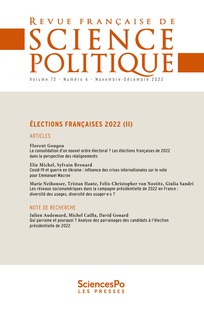Dans la même rubrique
- CEVIPOL
- FR
- Publications
- Articles
- Publiés en 2024
-
Partager cette page
COVID-19 et guerre en Ukraine Influence des crises internationales sur le vote pour Emmanuel Macron
Par Elie Michel avec Sylvain Brouard

RÉSUMÉ
Despite growing attention to income inequality in debates about European integration, our understanding of its effect on European Union support remains limited. Using European Social Survey data from 2002 to 2020, we analyse how income inequality and pro-redistribution attitudes shape diffuse and specific forms of support for the European Union. We find no direct effect of country-level income inequality, while individual support for redistribution has a negative effect on both. In line with benchmarking theory, inequality emerges as a contextual moderator: in unequal national settings, egalitarian citizens are comparatively more supportive of further integration than in more equal countries. This effect persists when we control for income position, suggesting an ideological rather than utilitarian basis for benchmarking European Union attitudes. We discuss implications in light of debates about a social Europe.
